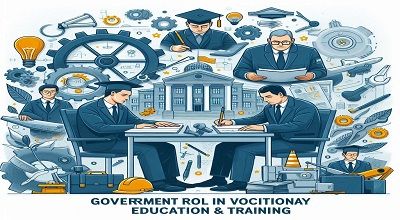Government Role in Vocational Education & Training
The government plays a significant role in Vocational Education and Training (VET) for several reasons, including economic development, workforce preparation, and addressing skill gaps. Here are some key ways in which governments are involved in VET:
- Regulation and Quality Assurance: Governments establish regulations and quality assurance mechanisms to ensure that VET providers deliver high-quality education and training. They set standards for curriculum, facilities, and instructors to maintain the credibility of VET programs.
- Funding and Subsidies: Governments often provide funding and subsidies to support VET institutions, making education more affordable and accessible to students. This financial support can come in the form of grants, loans, or direct funding to VET providers.
- Curriculum Development: Governments may collaborate with industry experts to design and update VET curricula. This ensures that the skills and knowledge taught in VET programs are aligned with the current and future needs of the job market.
- Workforce Planning: Governments analyze labor market trends and forecast future skill needs. They use this information to guide the development of VET programs. Making sure that the workforce is equipped with the necessary skills for economic growth.
- Certification and Qualifications: Governments are responsible for awarding and regulating vocational qualifications and certifications. These credentials verify that individuals have acquired the necessary skills and knowledge to perform specific jobs.
- Accessibility and Inclusivity: Governments aim to ensure that VET is accessible to all segments of the population, including disadvantaged groups. This may involve creating programs and incentives to attract underrepresented individuals to vocational training.
More here…
- Research and Data Collection: Governments often conduct research to assess the effectiveness of VET programs and identify areas for improvement. They also collect data on VET participation, completion rates, and employment outcomes.
- Apprenticeship Programs: Governments may create and oversee apprenticeship programs, which combine on-the-job training with classroom education. These programs are often funded, regulated, and monitored by the government to ensure quality and fairness.
- Career Counseling and Guidance: Governments may offer career counseling and guidance services to help individuals make informed decisions about their education and career paths. This can include information about VET options.
- International Collaboration: Governments may collaborate with other countries to ensure. VET qualifications are recognized internationally. This is important for individuals seeking employment opportunities abroad.
- Public Awareness and Promotion: Governments promote the value of VET to students, parents, and employers. They may run campaigns to raise awareness about the benefits of VET and its role in addressing workforce needs.
- Monitoring and Evaluation: Governments monitor and evaluate the performance of VET programs to ensure they are meeting their goals. This can involve regular inspections, assessments, and reviews of VET providers.
- Regulation of Private Providers: In addition to public institutions, governments often regulate. And oversee private VET providers to ensure they meet quality and accountability standards.
Summary
In summary, the government’s role in Vocational Education and Training is multifaceted. Encompassing regulation, funding, curriculum development, and various support mechanisms to ensure that VET programs are effective in preparing individuals for the workforce and promoting economic growth.
